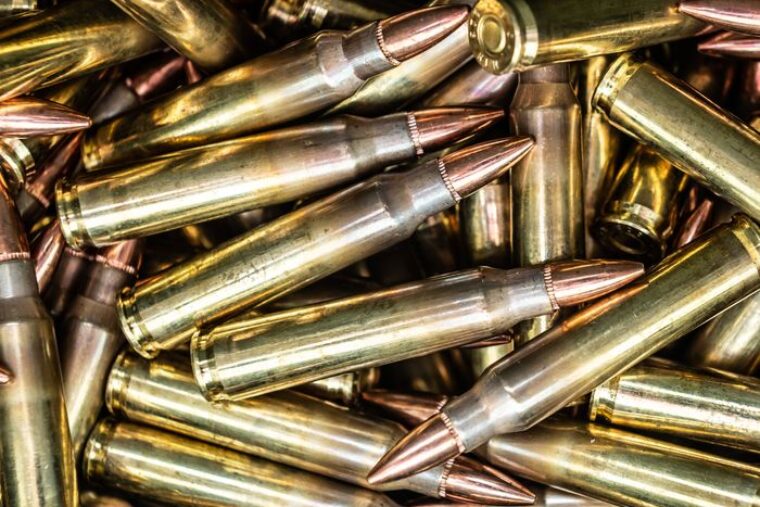Opponents of deal stress need for American ownership amid gunpowder shortage and concern over China-Russia influence
Opponents of the deal, including former Secretary of State Mike Pompeo and Sen. J.D. Vance (R., Ohio), an ally of former President Donald Trump, have alleged CSG links to China and Russia and urged the Treasury Department to block the sale through the Committee on Foreign Investment in the U.S., or Cfius, which is reviewing the purchase.
They have said that the CSG deal would give the foreign company a grip on domestic small-arms ammunition supply. Vista is entertaining a rival bid from a Texas investment group.
Michal Strnad of CSG says its purchase of Vista would deepen ties between the U.S. and a NATO ally. Photo: Jan Lopatka/Reuters
A CSG purchase of Vista could have an impact on “reliable access to an affordable supply of primers and ammunition,” Sen. John Kennedy (R., La.) wrote in a letter to Treasury Secretary Janet Yellen.
CSG Chief Executive Michal Strnad said the deal would “deepen the strategic industrial relations” between the U.S. and the Czech Republic, a North Atlantic Treaty Organization ally.
Even just a few years ago, the idea of a company in a NATO country buying a U.S. business focused on the civilian market would likely not have raised eyebrows. The dispute over the current deal reflects heightened fears of foreign influence and coincides with a global shortage of gunpowder. It also comes as the U.S. government appears to be increasingly disposed to disrupting foreign acquisitions that it determines could threaten national security.
The struggle over the company dates back to 2022, when an investor group led by Texas-based MNC Capital Partners and a Vista board member, Mark Gottfredson, made a series of bids to buy Vista’s ammunition business, offering as much as $1.8 billion.
In October last year, Vista announced that it had accepted CSG’s $1.91 billion bid; in December, the two companies filed a notice with Cfius, which they renewed in March.
Gottfredson resigned from the Vista board in January to make an offer for the entire company, according to MNC. The investor group led by MNC subsequently offered $3 billion for all of Vista—the company’s ammunition divisions as well as its outdoors business, including the binocular and scope maker Bushnell and the motocross brand Fox Racing.
“It needs to be held in American hands,” Gottfredson said.
Vista pushed its annual shareholder meeting from May to June, allowing for additional time to consider MNC’s bid. Shareholders are also expected to vote on the CSG deal then.
Vista’s leadership expects the CSG transaction to receive Cfius approval soon, a company executive said.
CSG has became a major supplier of military equipment to Ukraine. Photo: Michaela Nagyidaiova/Bloomberg News
“We remain confident in our ability to receive Cfius clearance, which is the final regulatory approval required for the closing of the transaction,” Vista said in a recent statement.
If the Cfius review were to recommend blocking the sale, it would effectively end CSG’s bid.
A Treasury Department spokeswoman declined to comment on the review but said that Cfius was “committed to taking all necessary actions within its authority to safeguard U.S. national security.”
CSG grew from the mass of decommissioned and surplus military goods and hardware that sloshed around Eastern Europe in the 1990s after the fall of the Soviet Union and the dissolution of the Warsaw Pact. A Czech national, Jaroslav Strnad, refurbished armored vehicles and sold them to armies abroad.
A dozen years ago, Strnad expanded into munitions production and scooped up defense companies and factories outside the Czech Republic. CSG revenue swelled by shifting to clients in NATO countries.
In 2018, Strnad stepped aside as CSG owner and chief executive in favor of his son, Michal, then in his 20s.
The company has expanded significantly under the younger Strnad. After Russia’s full-scale invasion of Ukraine in 2022, CSG became a major supplier of arms and equipment to Kyiv, shipping artillery rounds and systems, tanks and rocket launchers.
The increased cash and valuation have funded CSG acquisitions, including the purchase of a 70% stake in Fiocchi Munizioni, an Italian small-arms company that has production facilities in Arkansas and Missouri.
Sen. J.D. Vance (R., Ohio) has alleged that CSG has ties to Russia’s leadership. Photo: Victor J. Blue/Bloomberg News
Cfius approved that transaction, although the process was drawn out over seven months, associated with the upheaval of the Ukraine war.
“We are not a national-security risk,” said David Stepan, CSG’s investment director for international projects. “We are already doing business in the United States.”
Foreign ownership of American firearms companies isn’t novel. The Swiss gun maker SIG Sauer runs a plant in New Hampshire, while Austria’s Glock and Brazil’s Taurus have Georgia production facilities. The historic American firearms company Colt, an early producer of the AR-15 rifle, is itself owned by a Czech company.
Scrutiny of CSG’s history and intentions has intensified, however, as the availability of gunpowder globally has dwindled.
In a January letter to Yellen, Vance alleged that CSG had ties to Russia’s leadership. “We cannot afford for America’s supply of weapons to fall into the wrong hands,” he wrote.
Responding in April to Vance in an open letter, Michal Strnad emphasized CSG’s past work with American defense contractors including General Dynamics; NATO secret clearances held by several CSG subsidiaries; and CSG’s role in the supply of weapons to Ukraine.
Strnad said “any speculation about CSG’s connection” to the regime of Russian President Vladimir Putin “should be considered nonsense.”
A CSG spokesman said that the company had never dealt with the Russian military and that it closed its civilian, industrial truck business in Russia following Moscow’s 2022 invasion.
In his letter to Yellen, Kennedy, the Republican senator from Louisiana, also raised concerns about the company’s dealings with China.
In 2018, Eldis, a CSG subsidiary, signed a deal to provide 13 radar systems to a Chinese civilian air traffic agency, and to maintain them. A CSG spokesman said that it expects the contract to conclude this year and that the company has no other business in China.
The Biden administration appears to be taking a closer look at foreign investments. The White House announced recently that it was forcing a Chinese crypto-mining company to divest itself of land it owned near a U.S. nuclear missile base in Wyoming.
The obvious threat in a case such as CSG “would be that if the company were subjected to foreign ownership, they might not then at some point be willing to make available to the U.S. government stuff that it needed,” said William Reinsch of the Center for Strategic and International Studies, who served as the president of the National Foreign Trade Council.
While Vista has a significant number of nonmilitary clients, those criticizing the potential Czech purchase have said the national-security threat is real.
The National Sheriffs’ Association and the National Association of Police Organizations have opposed the CSG purchase, concerned that a foreign company would hold a significant portion of the U.S. small-arms ammunition market.
Established in the 1970s, Cfius has assumed a greater profile as U.S. concern has grown over the prospect that hostile foreign powers will use private-sector acquisitions to spy, threaten infrastructure and thwart U.S. defense capabilities.
After a Cfius review in 2012, President Barack Obama blocked a Chinese entity’s purchase of wind-farm projects near a U.S. Navy weapons training facility. The company won an appeal but agreed to sell its stake to a U.S.-approved buyer. In 2019, Cfius forced the Chinese company Kunlun to sell Grindr, the LGBTQ dating app, which it had recently purchased.
A significant Cfius case, the proposed $14.1 billion takeover of U.S. Steel by Japan’s Nippon Steel, has become a presidential campaign issue, with President Biden publicly opposing it even as Cfius continues its review.
Write to Brett Forrest at brett.forrest@wsj.com
Corrections & Amplifications
Vista Outdoor agreed to a sale of its ammunition business. An earlier version of this article incorrectly referred to a firearms business. (Corrected on May 22)
By Brett Forrest



